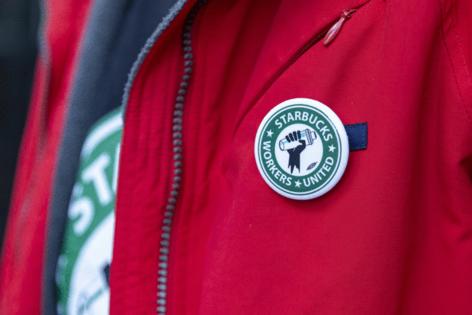Fed-up Starbucks baristas prep 'biggest strike we've ever been on'
Published in Business News
Unionized Starbucks baristas are preparing to go on strike next week and disrupt one of the coffee chain’s busiest days — aiming to secure a contract after years of sporadic and unsuccessful talks.
Starbucks Workers United — representing employees at about 550 of the chain’s roughly 10,000 company-run U.S. stores — said members voted to give union leadership the ability to call for a work stoppage at any time if demands aren’t met. It’s now gearing up to launch strikes in more than 25 cities on November 13. That’s the company’s popular holiday-themed Red Cup Day, which has been a previous union target. The labor actions could expand if there isn’t progress toward finalizing a contract and resolving legal disputes, said the union, which accused Starbucks of refusing to fairly negotiate.
“We are ready and willing to go on the biggest strike we’ve ever been on,” said Silvia Baldwin, a Philadelphia barista who is one of the delegates representing the union in negotiations. “If the company wants to avoid that, they can settle with us today.”
In an emailed statement, Starbucks Corp. spokesperson Jaci Anderson said: “We are disappointed that Workers United, who only represents around 4% of our partners, has voted to authorize a strike instead of returning to the bargaining table. When they’re ready to come back, we’re ready to talk." Starbucks has accused the union of making financially unsustainable proposals and has said that it already offers “the best job in retail,” with baristas receiving pay averaging more than $19 an hour, and compensation worth over $30 per hour when benefits are counted.
The strike threat marks the latest escalation in the union’s efforts to pressure Starbucks. Employees began voting to unionize some U.S. stores nearly four years ago, but have yet to secure a collective bargaining agreement. After years of high-profile conflict and controversy, the two sides announced in February 2024 that they had agreed to work together to resolve hostilities. But subsequent talks broke down late last year, and since then, tensions have been rising.
Regional directors of the U.S. National Labor Relations Board have issued more than 100 complaints against the company, alleging illegal anti-union tactics including closing stores, firing activists and refusing to fairly negotiate. Starbucks has denied wrongdoing.
Workers United delegates representing employees at Starbucks’ unionized stores voted in April to reject the company’s contract proposal, which organizers said fell short by only guaranteeing annual raises of at least 2%, and had no guarantees employees would get enough hours of work to qualify for the company’s benefits.
The union says the company has refused to offer any improved proposal since then, and that reaching a contract deal would cost Starbucks less than the roughly $100 million the company generates in global sales on average per day. Starting pay for Starbucks baristas in many states is as low as $15.25 an hour, according to the union.
Workers United has mounted strikes around the winter holidays each of the past few years. In 2024, Starbucks said that a Workers United strike in the lead-up to Christmas caused around 60 stores to temporarily close, while the overwhelming majority of its locations remained busy with customers.
Employees are prepared to mount strikes without a set end date that would last longer and grow bigger than their prior ones, according to the union, and have secured pledges from tens of thousands of allies not to buy from Starbucks during a work stoppage. Thousands of baristas participated in the strike authorization vote, with 92% voting in favor, according to Workers United.
“The difference about this action is that it’s open-ended, and we’re ready to continue escalating, if necessary,” said Jasmine Leli, a barista and union leader in Buffalo, New York.
It’s a sensitive time for the company. Starbucks has been trying to execute a turnaround plan under Chief Executive Officer Brian Niccol. Baristas, who are critical to the comeback plan, have sometimes bristled at changes instituted over the past year under Niccol. Some employees argue that one issue is a new policy requiring them to write uplifting messages on customers’ cups — part of an effort to make coffeehouses more welcoming — that amounts to an added burden making it more difficult to crank out beverages under increasingly strict time controls.
A round of store closures this past September also soured relations with hourly workers. Starbucks shuttered hundreds of stores across the country, including 59 unionized locations, with just a few days notice.
"Our customers can be assured that our partners will be ready to serve them at the vast majority of our 10,000 company-owned and 7,000 licensed locations across North America throughout the holiday season, regardless of the union’s plans," Starbucks said.
Starbucks has said that it receives over 1 million job applications per year, while also boosting store staffing and having a turnover rate that’s nearly half the industry average. “The facts show people like working at Starbucks,” the company said.
©2025 Bloomberg L.P. Visit bloomberg.com. Distributed by Tribune Content Agency, LLC.












Comments